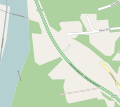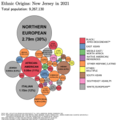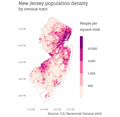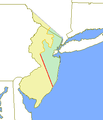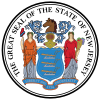Portal:New Jersey
The New Jersey Portal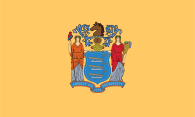 New Jersey is a state situated within both the Mid-Atlantic and Northeastern regions of the United States. It is the most densely populated of all 50 U.S. states, and is situated at the center of the Northeast megalopolis. New Jersey is bordered on its north and east by New York state; on its east, southeast, and south by the Atlantic Ocean; on its west by the Delaware River and Pennsylvania; and on its southwest by Delaware Bay and Delaware. At 7,354 square miles (19,050 km2), New Jersey is the fifth-smallest state in land area, but with close to 9.3 million residents as of the 2020 United States census, its highest decennial count ever, it ranks 11th in population. The state capital is Trenton, and the state's most populous city is Newark. New Jersey is the only U.S. state in which every county is deemed urban by the U.S. Census Bureau with 13 counties included in the New York metropolitan area, seven counties in the Philadelphia metropolitan area, and Warren County part of the heavily industrialized Lehigh Valley metropolitan area. New Jersey was first inhabited by Paleo-Indians as early as 13,000 B.C.E., with the Lenape being the dominant Indigenous group when Europeans arrived in the early 17th century. Dutch and Swedish colonists founded the first European settlements in the state, with the British later seizing control of the region and establishing the Province of New Jersey, named after the largest of the Channel Islands. The colony's fertile lands and relative religious tolerance drew a large and diverse population. New Jersey was among the Thirteen Colonies that supported the American Revolution, hosting several pivotal battles and military commands in the American Revolutionary War. On December 18, 1787, New Jersey became the third state to ratify the United States Constitution, which granted it admission to the Union, and it was the first state to ratify the U.S. Bill of Rights on November 20, 1789. (Full article...) Selected article -
The Darlington's Bridge at Delaware Station was a highway bridge over the Delaware River in the community of Delaware, New Jersey (known locally as Delaware Station). Formerly a railroad bridge constructed by the Delaware, Lackawanna and Western Railroad in 1855, the bridge was sold off when the new one upstream was constructed. Henry V. Darlington, an Episcopal minister in Delaware and nearby Belvidere offered to buy the second-hand bridge for $5,000 (1914 USD, equal to $152,093 today). Darlington converted it into a highway bridge, using two fired members of the nearby Meyer's Ferry to be toll collectors. The bridge prospered, becoming a part of State Highway Route 6 in 1927 and U.S. Route 46 in 1936. In 1932, during the massive state takeover of bridges by the Delaware River Joint Toll Bridge Commission, Darlington refused offers, bargaining his way up to $275,000 (1932 USD, equal to $6,141,220 today) before accepting the sale. This amount was a far cry from the nearby Belvidere-Riverton and Portland-Columbia Covered Bridge, which were accepted for $60,000 (equal to $1,339,902 today) and $50,000 (equal to $1,116,585 today) respectively. On that moment, tolls along the bridge and Route 6 were eliminated. The bridge prospered toll-free for another 21 years, until the construction of the Portland-Columbia Toll Bridge upstream at Columbia. Although Reverend Darlington was still alive to see all this transpire, the Commission ceased operations on the Darlington Bridge on April 3, 1954, and the bridge was immediately demolished.
Selected picture - Credit: Zeete Rutgers University is the largest institution for higher education in the state of New Jersey. It was originally chartered as Queen's College in 1766, and is the eighth-oldest college in the United States. New Jersey news'Related portalsSelected biography -Elizabeth Clow Peer Jansson (February 3, 1936 – May 26, 1984), often just Liz Peer, was a pioneering American journalist who worked for Newsweek from 1958 until her death in 1984. She began her career at Newsweek as a copy girl, at a time when opportunities for women were limited. Osborn Elliott promoted her to writer in 1962; two years later she would be dispatched to Paris as Newsweek's first female foreign correspondent. Peer returned to the United States in 1969 to work in Newsweek's Washington, D.C., bureau. When forty-six of Newsweek's female employees filed a complaint with the Equal Employment Opportunity Commission, Peer remained on the sidelines. She was passed over for promotion to senior editor in 1973 for reasons that remain unclear. Peer returned to Paris in 1975 as bureau chief, and became Newsweek's first female war correspondent in 1977 when she covered the Ogaden War. Her reporting there won her recognition, but she suffered a debilitating injury from which she never recovered, leading to her suicide in 1984. (Full article...)Did you know? -
General imagesThe following are images from various New Jersey-related articles on Wikipedia.
TopicsQuality content
CategoriesThings you can do
For more information on how you can help, see the WikiProject New Jersey. Associated WikimediaThe following Wikimedia Foundation sister projects provide more on this subject:
Discover Wikipedia using portals |

